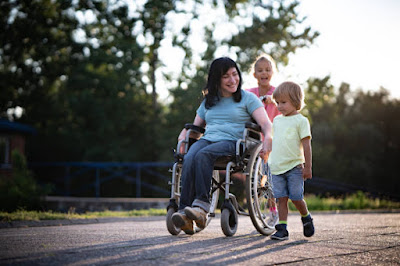Read more
Some patients regain the ability to feel and move after
spinal cord shock, some do not. During spinal cord shock, no test can be done to determine the extent of the injury. So try to
understand that at this stage the doctors and nurses cannot give precise
answers to your questions about your condition and they really cannot give you
a definite answer at this initial stage. They try not to give you too much
hope for the future, but at the same time not to give up hope.
After the spinal cord shock process is over, the severity of
the injury is revealed and more precise plans can be made for the
future. A careful assessment of residual sensation and range of motion
will help understand how spinal cord injury (OZ) will affect the
patient.
Severe OZIs mean that the injury is to the neck or back, in
which case the damage will be more severe than injuries to the lower back (even
if the injury is more severe). For example, the legs, as well as the arms, are very likely to be affected. However, patients may regain their limb
feeling and mobility if their spinal cord is partially (but not completely)
damaged. Some severe injuries may require assistance with breathing
exercises.
In the lesser degree of injury, which means the injury to
the chest or lower back, the arms are not affected, but the leg functions are
affected. Again, patients may regain the ability to feel or move their
legs later, this is related to the complete or partial injury. Gaining the
ability to move hands and arms makes the patient more comfortable in daily
life. In this case, patients can lead an independent lifestyle after the
healing process is complete.
OZs can also have complications that affect other patients
from the obvious damage - the inability to feel and move below the level of
damage. Perhaps the most difficult to accept of these is limited control
of bowel and urinary functions. During spinal cord shock, this control may
be lost completely. Some of these checks come back after weeks and months,
depending on the severity and level of the injury. As a result of the
right training and good motivation, the basic functions of these controls can
be learned and new styles can be gained. While those with lower spinal
cord injury may gain enough movement and sensation ability to fully control
such activities themselves,
Healing is a continuous process that begins immediately
after injury. The aim is to ensure as long-term independence as
possible. Different activities are included in the healing
process. These include the prevention of long-term complications by
medical professionals and nurses, personalized exercise programs by
physiotherapists and specialist therapists, functional training, and the
preparation and provision of useful and personalized aids.
In the future, muscles and joints; Active and passive
exercise should be started as soon as possible after the injury to prevent them
from doing and holding basic but important movements such as eating, washing,
dressing, and getting from a wheelchair to bed. During recovery, everyone
with OZsi is shown activities and techniques specific to their condition, which
will enable them to carry on with their daily lives.
At any level of injury, it is very important to strengthen
the still functioning muscles with exercise to continue to live
independently, no matter how weak. At first, pain from the injury may
limit movement, but as healing begins, a person's ability to exercise
increases.
Ensuring the independence of someone with OZ in this way
allows them to have a more active social life and a more positive outlook on
life. This is for the well-being of not only the patient, but also the
people around him, his family, friends, colleagues, and medical professionals
who make an important contribution to the patient's life.
Whatever the damage, someone with OZ will definitely make
progress later on. How much this progress will depend on the patient and
those around him, as well as on the level of injury. Even if a person
loses the ability to walk, they do not lose the ability to think, plan, love,
care, have fun, work, and enjoy life. Technological advances mean that
more possibilities are available to people with OZ and that people with OZ can
lead more active and more rewarded lives.
Support from family and friends can make huge improvements,
especially if they can take an active role in the therapy program. Family
and friends should be very supportive of the person with OZ as the person they
love will have trouble accepting their situation during the very difficult,
first months or even years of the injury.
Going through periods of depression and anger may cause low
motivation for the development of the person with OZS. These are normal
reactions to such a serious injury, and often require the concerted efforts of
family, friends, nurses, and medical professionals to adjust to this difficult
situation and become more positive and independent.
In addition to getting used to this difficult situation,
your friend or relative who has had an accident will need to get used to many
changes, such as taking on the role of the carer or contributing to the family
budget. This process of getting used to is a situation that you have to
get used to as much as the person you love. Developing this process within
the framework of information based on facts instead of basing it on unrealistic
ideas will make everyone's life easier and more comfortable.



0 Reviews